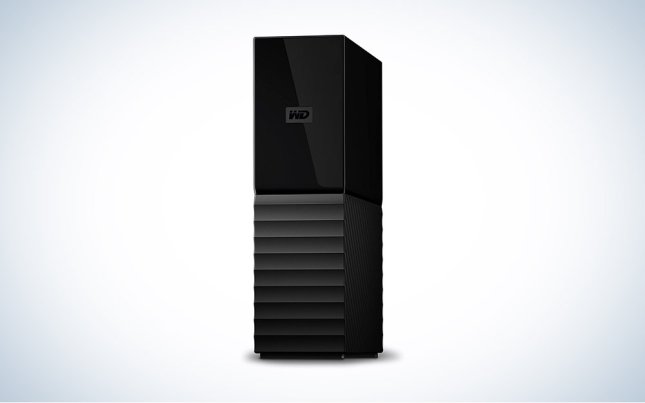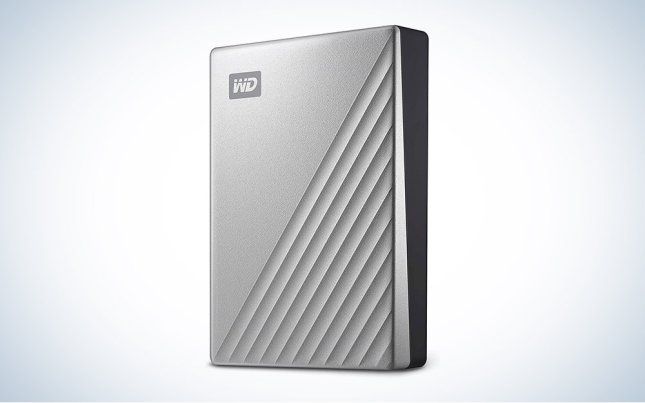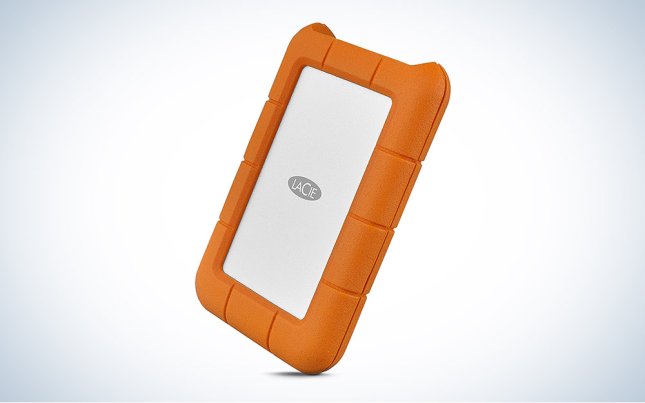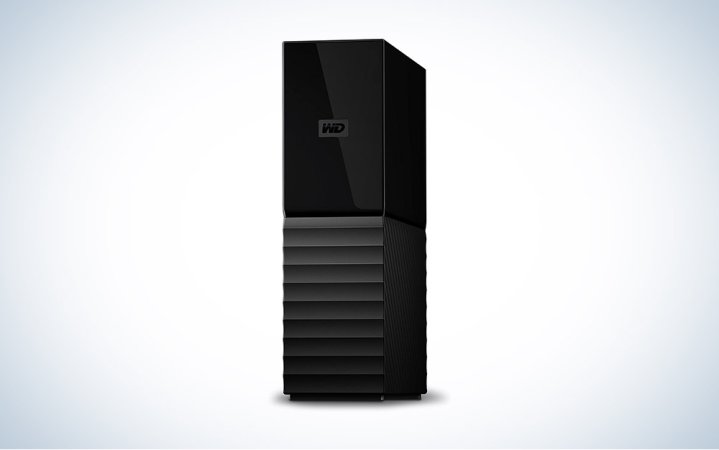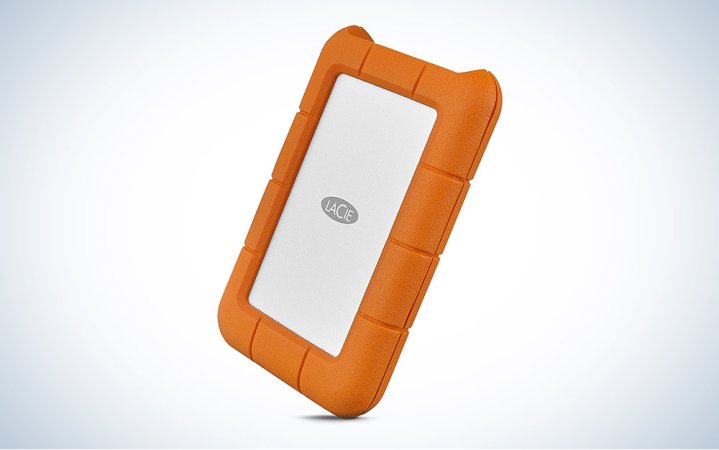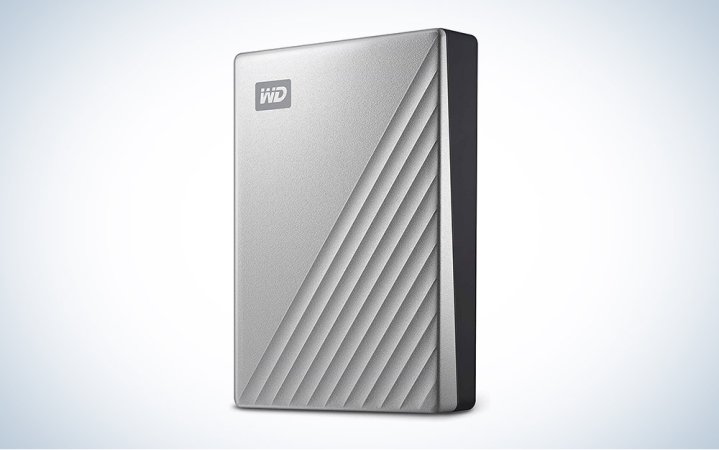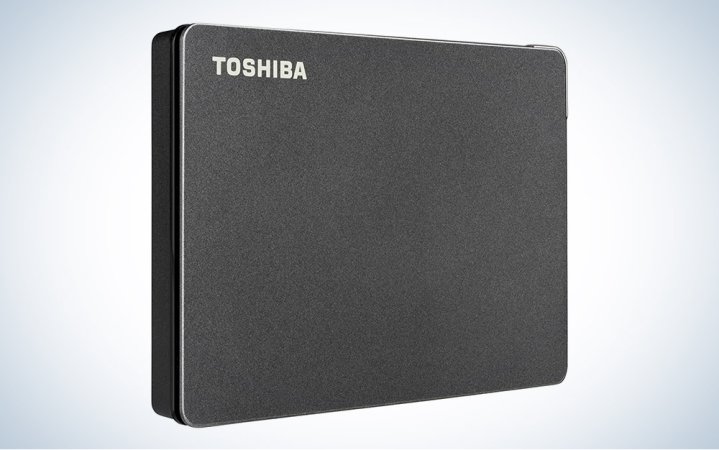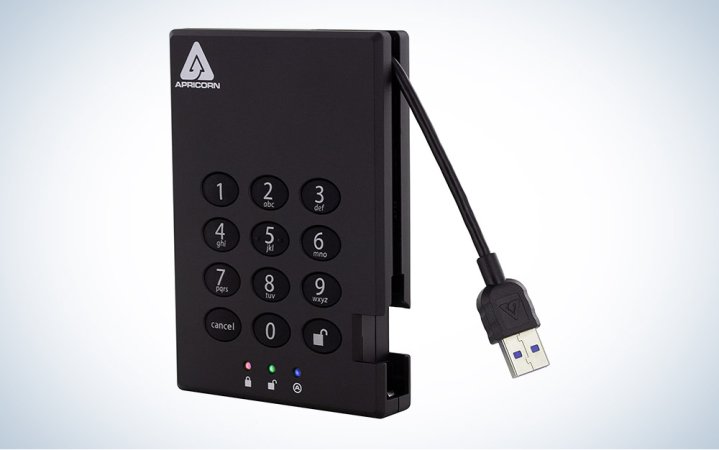We may earn revenue from the products available on this page and participate in affiliate programs. Learn more ›
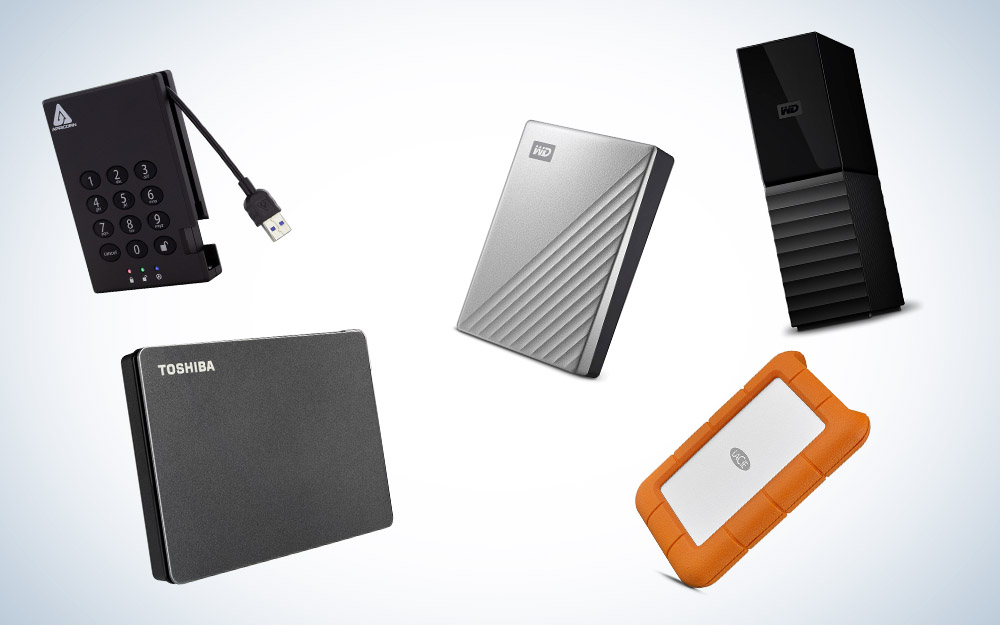
The best external hard drives are the unsung heroes of the gadget world. As long as you regularly put them to work, they provide an invaluable safety net against computer crashes and other types of digital catastrophes. Choosing the right model is crucial. People won’t go through the regular backup process if it’s tedious or annoying. This list of drives provides recommendations for some common users. These magical little boxes can hold your photo archive, your music collection, and anything else you don’t want fading into the digital aether in the case of a computer meltdown.
There are some choices you’ll have to make in order to get the correct model. What kind of connectivity do you need? How fast should your drive be? And will it be staying on your desk or going out into the world with you? We’ll walk you through the process of picking the best external hard drive for you.
- Best for PC: Western Digital My Book
- Best for photographers: LaCie Rugged
- Best for Mac: WD My Passport Ultra for Mac
- Best for gaming: Toshiba Canvio Gaming
- Best with encryption: Apricorn Aegis Padlock
How we picked the best external hard drives
I have been writing about gadgets and computer gear for nearly two decades now. I have also worked as a professional photographer and videographer. During that time, I’ve gone through literally dozens of different hard drives, which has given me valuable personal experience.
In addition to first-hand research, we also scoured online sources and editorial reviews. We directly compared dozens of drives on criteria such as price, feature set, size, and reliability. We also gathered input from other professionals and users.
The best external hard drives: Reviews & Recommendations
Best for PC: Western Digital My Book
Best for PC
Solid protection
Pros
- Lots of capacity options
- Included security and backup software
- Relatively quiet
- Reliable
Cons
- Not portable
- May need formatting to work with Mac
Why it made the cut: WD’s solid reputation and extensive suite of useful utilities make this a simple way to handle storage for most people. It’s one of the best external hard drives for PC.
Specs:
- AC power
- Capacities up to 18 TB
- USB 3.0
This Western Digital external drive promises capacities from an already roomy 3 TB all the way up to an absurdly spacious 18 TB in case you’re storing tons of data. It’s meant to sit on a desk, so it needs an external power supply, but that makes it especially easy to use with a desktop computer.
Compared to the company’s more basic models, WD’s My Book line offers a relatively extensive suite of included utilities, including an automatic backup solution and several security measures to keep your data safe from prying eyes. It connects to a computer via USB 3.0, so it’s plenty fast for backing up, but you shouldn’t expect to use it for professional video editing or anything similar. At 5.5 x 1.9 x 6.7 inches, it doesn’t take up much room on your desk.
This combination of price, built-in features, and capacity options make this a very solid choice for just about anyone who wants to find the simplest way to keep their data backed up. We suggest getting two of them and mirroring them just to make sure you have a second backup in case one fails. It sounds like overkill until all your stuff is gone after the cat goes rampaging across your desk.
Best for photographers: LaCie Rugged
Best for photographers and videographers
Field friend
Pros
- No external power supply required
- Resists water, drops, and dust
- Small and light
- High-visibility orange bumper
Cons
- Limited capacity
Why it made the cut: This is the best external hard drive for photographers and videographers. These rugged drives are small enough to flip into a camera bag, but can stand up to the rigors of working on the road.
Specs:
- USB-power
- Capacities up to 5 TB
- USB-C or USB-3
Photographers have been using these LaCie Rugged drives for years. Many have switched over to high-speed SSD versions, but the HDD versions are still very useful and often considerably cheaper. These slim drives connect to a computer via USB-C or USB 3.0 with an adapter. It promises up to 130 MB/s transfer speeds for quick backups in the field. Despite its capacity and speed, it still weighs well under a pound.
The orange bumper actually helps protect the drive from drops in addition to making it easier to spot and harder to accidentally leave behind. Because it doesn’t require external power, the drive can pull all the juice it needs right from your laptop. That makes backing up in the field simple.
In case the drive should suffer a failure, LaCie offers a two-year data rescue recovery service along with the device in order to try and save your data. It’s unlikely, though, since the aluminum body resists rain, drops, and even crushing. So, accidentally sitting on your hard drive isn’t a huge deal.
Best for Mac: WD My Passport Ultra for Mac
Best for Mac
Apple backup
Pros
- No formatting needed for Mac use
- Light (0.51 pounds)
- Slim (0.5-inches thick)
- No external power required
Cons
- PC users will need to format
Why it made the cut: This is the best external hard drive for Mac and includes handy basic features like password protection.
Specs:
- USB power
- Capacities up to 5 TB
- USB-C or USB 3.0
Macs and Windows-based machines play nicer now than they ever have in the past. But, many hard drives will still require you to format them right out of the box if you want to use them with an Apple computer. It’s not a huge deal, but it’s an extra step in an already un-fun process.
WD’s My Passport Ultra for Mac comes pre-formatted so you can simply plug it in and start using the drive with your iMac or MacBook Pro. It offers up to 5 TB of storage and doesn’t require an external power source so it’s easily portable. It weighs just over a half-pound and is just a half-inch thick, which makes it easy to slip into most bags or even a pocket in a pinch.
In order to step up the Mac theme, the metal case matches the look of typical silver-hued Mac computers. The USB-C connection is backwards compatible with USB 3.0. The fast, reliable connection is a necessary feature for a drive you’ll want to rely on.
Best for gaming: Toshiba Canvio Gaming
Best for gaming
Game on
Pros
- Compatible with PlayStation 5 and Xbox Series
- Customized for gaming
- Also available in 4 TB
Cons
- Doesn’t include password protection software
Why it made the cut: Firmware tweaks keep this drive running all the time to serve the needs of data-hungry consoles, making it the best external hard drive for gaming.
Specs:
- USB power
- Capacities up to 4 TB
- USB 3.0
Current-gen video games have climbed in size to well over 100 GB, which quickly eats away a console’s built-in storage. This USB-powered drive has an “always on” mode in its firmware that will keep the drive from hiccuping and screwing up your gameplay. It works with current-gen consoles including the PS5 and Xbox Series X, but it’s also backwards compatible with the PS4 and the Xbox One. It also works with PCs.
It comes in 1 TB, 2 TB, and 4 TB options depending on how much extra storage you need. Also, if you decide you’re done with gaming and just want to use the drive to backup your normal data, you can do that, too.
The design offers several color options, which allows users to choose a hue that matches their gaming setup. This is ultimately a fairly barebones drive, which is what you want in this situation. It’s literally plug-and-play.
Best with encryption: Apricorn Aegis Padlock
Best with encryption
Safe storage
Pros
- Super secure FIPS PUB 197 Validated Encryption Algorithm
- Self-destructs if hackers try too hard to get in
- Sealed outer shell to prevent ingress
Cons
- Expensive per GB
- Chunky
Why it made the cut: This super-secure drive has a built-in keypad and military-grade encryption to keep data safe.
Specs:
- USB power
- Capacities up to 2 TB
- USB 3.0 connection
- Built-in keypad and encryption
If you’re storing especially sensitive data or you’re just super into security, a drive like the Apricorn Aegis Padlock might give you peace of mind. It has up to 2 TB of storage inside and a built-in USB-3 connector.
The case itself is sealed with tough epoxy, so anyone trying to physically get into the device will have a very hard time. The drive uses a military-grade FIPS PUB 197 Validated Encryption Algorithm to keep the data on it safe from even the most sophisticated hacking tools. The wear-resistant keypad on the front lets users type in a code to unlock the device. LED indicators also show when the drive is connected, secure, and unlocked.
There are even backup security measures. For instance, if a bad actor tries to use a brute force attack (which rapidly tries many different access codes in succession), the drive can self-destruct and leave the data onboard useless.
It only weighs half a pound, but your capacity options are limited and the drive itself looks rather dated. But, if your primary concern is security, that likely doesn’t matter all that much.
Things to consider before buying the best external hard drives
Here are some things you should know before digging into the world of external hard drives.
Hard drives vs. solid state drives
It’s worth knowing the difference between SSDs and HDDs. All the entries on this list are hard drives, which means they have spinning platters inside to store their data. SSDs, however, don’t have moving parts. SSDs are typically faster and smaller, but typically limit the amount of data they can hold.
Capacity
When it comes to capacity, you should have a real idea of how much data you have and how much you’ll have in the future. Most drives measure their capacity by terabyte, which represents 1,000 gigabytes. Lots of storage is good to have, but you don’t want to pay extra for space that will sit unused for the life of the device. Also, if you don’t need fast transfer speeds or large capacities, you may also be able to opt for a portable drive that doesn’t need external power.
Power requirements
Some drives can draw enough power from their USB ports, while others require an AC adapter connected to the wall. Portable drives typically offer smaller capacities and typically slower transfer speeds, so they aren’t ideal if they’re always going to sit on your desk or you’re trying to back up huge libraries of data.
Formatting
Almost any drive will work on PC or Mac. Some, however, might need reformatting before they’ll connect to one of the platforms. Typically PCs can expect to connect and immediately start using a drive. Macs are more likely to require formatting the drive.
Connectivity
You’ll want to make sure your drive will connect to your computer. Most current drives use a mixture of USB-C and USB 3.0. Make sure the drive you choose comes with the correct cable or buy an upgraded cable to get you the connection you need.
FAQs
You should realistically expect to replace your hard drives between three and five years. That may sound conservative, but hard drives have moving parts that break down over time. You don’t want it to fall apart and take your data with you.
Solid state drives may last longer than hard drives, but they also cost a lot more per gigabyte, so they’re often not the best option when backing up your entire digital life. If you only have a small amount of data to backup, an SSD will offer faster transfers and no mechanical breakdowns.
If you’re looking for the best bang for your buck in terms of storage, a powered drive like the WD Essentials line that offers huge capacity and basic features for cheap prices. Many portable drives also offer moderate amounts of storage for reasonable prices. The trick to affordability is not paying for storage or features you don’t need.
Final thoughts on the best external hard drives
If you’re not regularly backing up your digital data, you should be. Choosing the best external hard drive will make the process simple and quick, which means you’re a lot likely to actually go through with it.
You may not need the biggest, fastest, or most secure drive in the world, so picking the best option for your needs can save you money, space, and hassle.
